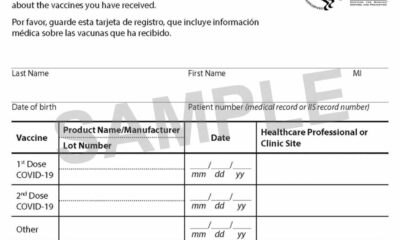Health
Vaccines May Help Delay Onset of Dementia, New Research Shows

Oxford, England — A recent study highlights the potential of several existing vaccines to reduce the risk or delay the onset of dementia, a condition that affects over 55 million people globally. The alarming rise in dementia cases is projected to triple by 2050.
Dementia encompasses various neurological conditions resulting in cognitive decline over time. Common types include Alzheimer’s disease, vascular dementia, and dementia with Lewy bodies. Although no cure exists, some treatments and lifestyle changes can improve patients’ quality of life.
Research from institutions like the University of Oxford and Stanford has revealed that vaccines for diseases such as shingles, respiratory syncytial virus (RSV), influenza, and pneumococcus may offer protection against dementia. Experts suggest that understanding the vaccination schedule and who is eligible could help many individuals safeguard their brain health.
Evidence indicates that seniors aged 60-65 who receive annual flu shots have a significantly lower risk of developing dementia. A study involving U.S. veterans discovered that those who consistently got flu vaccinations were about 40% less likely to develop Alzheimer’s over four years.
The Shingrix vaccine, for shingles, has also shown promise. Research linked it to a 17% lower risk of dementia over six years compared to an older vaccine, Zostavax. Shingrix appears to lower dementia risk more than other vaccines, underscoring the importance of vaccination in older adults, especially those who had chickenpox.
Another noteworthy finding revolves around the Arexvy vaccine against RSV. It was associated with a 29% reduction in dementia diagnoses in individuals over 60 within 18 months of vaccination. Experts speculate that the adjuvant in Arexvy could enhance immune response and subsequently protect neurohealth.
Pneumococcal vaccines and the Tdap vaccine have likewise been associated with diminished dementia risk. Certain studies suggest pneumonia vaccination can lower Alzheimer’s risk by up to 40% in older adults, emphasizing the need for regular immunizations in this age group.
Researchers believe the effectiveness of these vaccines against dementia may stem from multiple factors, including reducing infections and inflammation, stimulating immune responses beneficial to brain health, and delaying the onset of symptoms through cumulative protection.
Continued vaccine research and public health recommendations could have significant implications for combating the rising dementia epidemic.












